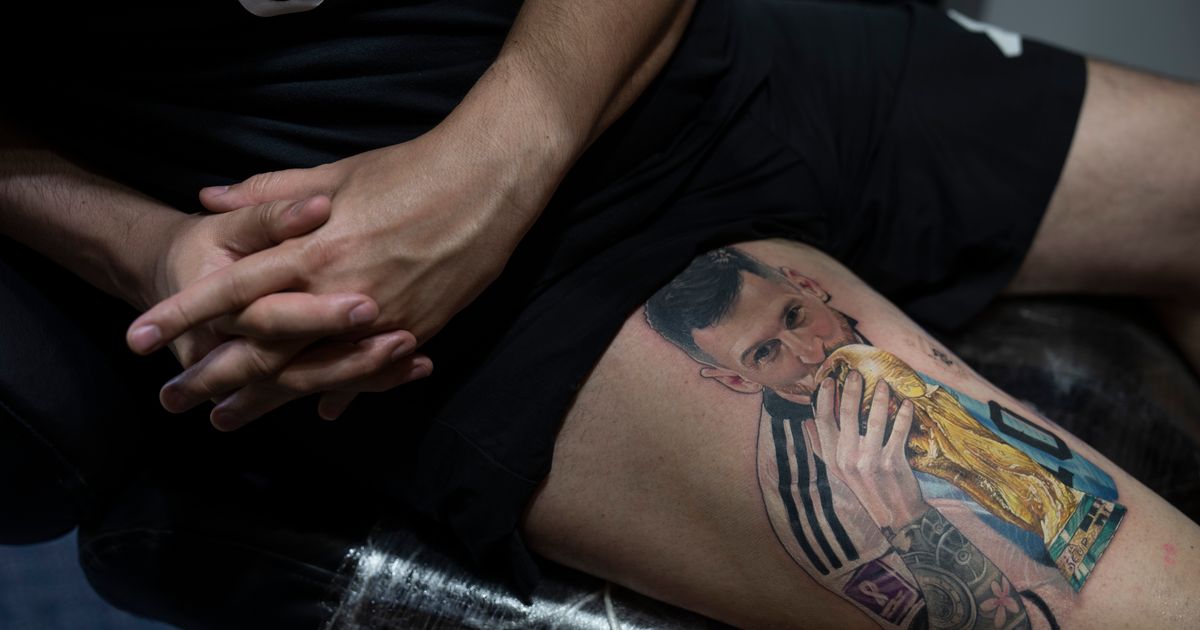
BUENOS AIRES, Argentina (AP) — Argentina has tattoo fever.
Sometimes it’s to fulfill a promise, other times as a way to say thank you or simply to immortalize on the skin what was by all accounts an unforgettable moment.
Argentina’s victory in the soccer World Cup tournament in Qatar has suddenly meant that many tattoo artists across the country are fully booked. They are working overtime with designs that often include superstar Lionel Messi holding the trophy and the three stars allude to the number of times the South American country has won the global soccer competition.
The phenomenon is particularly pronounced among those who are younger than 30 and had never seen the national squad win a World Cup. Argentina previously won the most important trophy in the soccer world in 1978 and 1986.
The trend is a vivid display of how strongly the World Cup victory has affected Argentines at a time when their country has been stuck in economic malaise for years. It has one of the world’s highest inflation rates, running close to 100%, and almost four of every 10 people live in poverty.
After lying on a chair for almost two hours in a tattoo shop in Argentina’s capital of Buenos Aires, Sasha Mortier finally fulfilled a promise he made before the World Cup even started: To get a tattoo of the trophy and the date of the championship match on the side of his torso.
“A whole generation never lived through this,” said Mortier, 26. “We needed it. The country is going through a tough time and I think it had been a while since we last experienced this time of happiness.”
The 36 long years that passed since soccer legend Diego Maradona lifted the World Cup in Mexico amounted to a heavy burden for fans in Argentina, a soccer-crazed country that lives the sport with particular intensity.
Mortier still has one pending promise to fulfill, because he and a friend also vowed to get a tattoo of a rock they found on the ground right before the national team began the penalty shootout against the Netherlands in the quarterfinal.
“It’s a horrible rock from the ground, but it gave us luck,” Mortier said. “You choose to believe.”
Shortly after returning from Qatar, Sebastián Fernández headed to Yeyo Tattoos in a southern Buenos Aires suburb with a clear image in his head: Messi kissing the trophy before the awards ceremony.
“That image of the kiss or of Argentina as world champions in 2022 will be historic. It fills me with pride to have been there,” Fernández said. “I wanted to portray something that recalls that experience and gives me back a little of the feelings I had at the time.”
César “Yeyo” Molina, a well-known tattoo artist in soccer circles, said he has never had to contend with so much demand.
“The madness over the Cup is impressive,” Molina said as he put color in the Messi tattoo that covers Fernández’s entire thigh and took two days to finish. “Work wise, we’re at an incredible time, we can’t keep up. … I’ve never seen anything like this.”
Molina is well-known for designing hyperrealistic tattoos, which makes him particularly popular among those who want a specific moment in history embedded on their skin. His tattoos generally cost at least $300, a high price for the average Argentine.
Some fans without deep pockets have been trying to get tattoos on the cheap and the results have gone viral on social media. One of the most notorious cases involves a tattoo of Messi that makes it look like the player is overweight and has a prominent double chin.
Santiago Aposto, a 31-year-old Argentine who lives in Mexico, did not want to take any chances and went to a reputable tattoo studio in Buenos Aires to fulfill a promise he made to underline his hope for Argentina to survive the tournament’s group phase after its surprise 2-1 loss to Saudi Arabia.
“When you live abroad you become even more Argentine,” Aposto said as he was getting a tattoo of Messi kissing the World Cup trophy. “For my generation it’s a little like what our parents lived through with Maradona. He’s from our generation, we feel him as our own, as our representative in the world.”
After Messi, another player that many fans want to get tattooed is goalkeeper Emiliano Martínez, who goes by the nickname “Dibu” and turned into a local hero for his performance in the team’s penalty shootouts against the Netherlands in the quarterfinal and France in the final.
Valentín Bobadilla, 20, got a tattoo of the controversial gesture the goalkeeper made when he took the Golden Glove award for best goalkeeper of the tournament and held it to his groin.
“The gesture that some people find vulgar really caught my eye,” Bobadilla said. “After the quarterfinals against Holland, I had this affection for ‘Dibu,’ and even more so after what he achieved in the final.”
___
Associated Press writer Débora Rey contributed to this report.